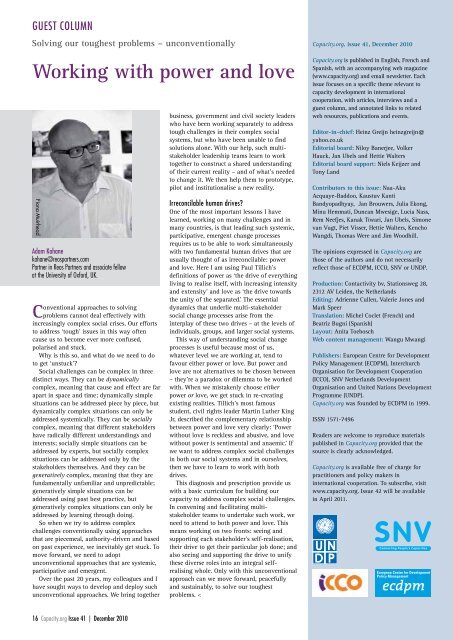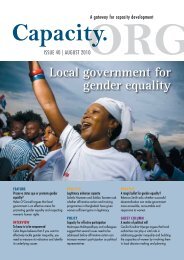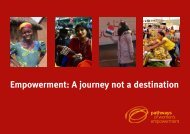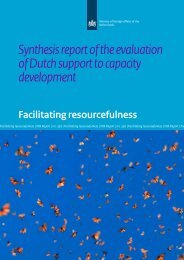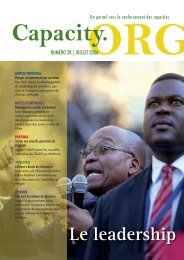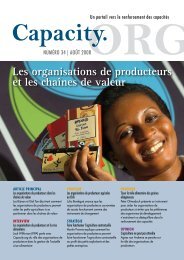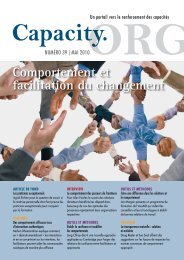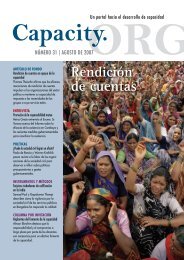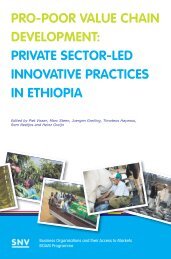Facilitating multi-actor change - Capacity.org
Facilitating multi-actor change - Capacity.org
Facilitating multi-actor change - Capacity.org
Create successful ePaper yourself
Turn your PDF publications into a flip-book with our unique Google optimized e-Paper software.
guest columnSolving our toughest problems – unconventionallyWorking with power and loveFiona MuirheadAdam Kahanekahane@reospartners.comPartner in Reos Partners and associate fellowat the University of Oxford, UK.Conventional approaches to solvingproblems cannot deal effectively withincreasingly complex social crises. Our effortsto address ‘tough’ issues in this way oftencause us to become ever more confused,polarised and stuck.Why is this so, and what do we need to doto get ‘unstuck’?Social challenges can be complex in threedistinct ways. They can be dynamicallycomplex, meaning that cause and effect are farapart in space and time; dynamically simplesituations can be addressed piece by piece, butdynamically complex situations can only beaddressed systemically. They can be sociallycomplex, meaning that different stakeholdershave radically different understandings andinterests; socially simple situations can beaddressed by experts, but socially complexsituations can be addressed only by thestakeholders themselves. And they can begeneratively complex, meaning that they arefundamentally unfamiliar and unpredictable;generatively simple situations can beaddressed using past best practice, butgeneratively complex situations can only beaddressed by learning through doing.So when we try to address complexchallenges conventionally using approachesthat are piecemeal, authority-driven and basedon past experience, we inevitably get stuck. Tomove forward, we need to adoptunconventional approaches that are systemic,participative and emergent.Over the past 20 years, my colleagues and Ihave sought ways to develop and deploy suchunconventional approaches. We bring togetherbusiness, government and civil society leaderswho have been working separately to addresstough challenges in their complex socialsystems, but who have been unable to findsolutions alone. With our help, such <strong>multi</strong>stakeholderleadership teams learn to worktogether to construct a shared understandingof their current reality – and of what’s neededto <strong>change</strong> it. We then help them to prototype,pilot and institutionalise a new reality.Irreconcilable human drives?One of the most important lessons I havelearned, working on many challenges and inmany countries, is that leading such systemic,participative, emergent <strong>change</strong> processesrequires us to be able to work simultaneouslywith two fundamental human drives that areusually thought of as irreconcilable: powerand love. Here I am using Paul Tillich’sdefinitions of power as ‘the drive of everythingliving to realise itself, with increasing intensityand extensity’ and love as ‘the drive towardsthe unity of the separated.’ The essentialdynamics that underlie <strong>multi</strong>-stakeholdersocial <strong>change</strong> processes arise from theinterplay of these two drives – at the levels ofindividuals, groups, and larger social systems.This way of understanding social <strong>change</strong>processes is useful because most of us,whatever level we are working at, tend tofavour either power or love. But power andlove are not alternatives to be chosen between– they’re a paradox or dilemma to be workedwith. When we mistakenly choose eitherpower or love, we get stuck in re-creatingexisting realities. Tillich’s most famousstudent, civil rights leader Martin Luther KingJr, described the complementary relationshipbetween power and love very clearly: ‘Powerwithout love is reckless and abusive, and lovewithout power is sentimental and anaemic.’ Ifwe want to address complex social challengesin both our social systems and in ourselves,then we have to learn to work with bothdrives.This diagnosis and prescription provide uswith a basic curriculum for building ourcapacity to address complex social challenges.In convening and facilitating <strong>multi</strong>stakeholderteams to undertake such work, weneed to attend to both power and love. Thismeans working on two fronts: seeing andsupporting each stakeholder’s self-realisation,their drive to get their particular job done; andalso seeing and supporting the drive to unifythese diverse roles into an integral selfrealisingwhole. Only with this unconventionalapproach can we move forward, peacefullyand sustainably, to solve our toughestproblems.


